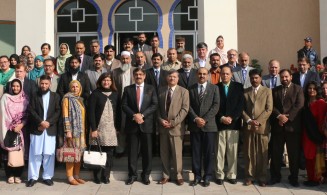

Sharing experiences on successful family learning programmes for the creation of a resource pack
family-learning-workshop.jpg

The UNESCO Institute for Lifelong Learning (UIL) has long promoted family learning as a bridge between formal, non-formal and informal learning to effectively engage communities in lifelong learning and improve literacy skills. As the first step towards a new family learning project with a focus on gender equality and the sub-Saharan Africa region, a three-day international workshop took place at the Institute in Hamburg, Germany, from 23 to 25 November 2016. The event, entitled ‘International Workshop for the Development of a Resource Pack to Reach Vulnerable Families with Intergenerational Approaches to Literacy’, brought together twenty-one specialists in intergenerational approaches to learning from around the world. These experts, gathered at UIL to share good practices and lessons learned; these will be used to develop a resource pack for literacy stakeholders in UNESCO Member States.
In the opening session, UIL Director Arne Carlsen pointed out the importance of the meeting, particularly, when it comes to ‘documenting the impact that is being made in people’s lives when they acquire literacy and numeracy skills’. This was a key aspect of the workshop, the aim of which was to develop evidence-informed guidance based on experiences of successful intergenerational learning programmes.
A UIL resource for the development of integrated and intergenerational approaches to literacy and learning
Representatives from successful family literacy and learning programmes featured on UNESCO’s Effective Literacy and Numeracy Practices Database (LitBase) participated in the workshop. Several crosscutting concepts to be included in the resource pack were agreed upon; these include that it should:
- foster gender equality as a human rights-based approach;
- focus on the development and strengthening of literacy and numeracy skills of people of all ages;
- promote lifelong learning; and
- support learning approaches that celebrate cultural and linguistic diversity as a resource rather than a challenge.
Moreover, in the group work sessions, participants analysed examples of learning materials and brought forward recommendations on the ones to be included in the resource pack. They also agreed upon the structure of the resource pack, which will be divided into two sections as follows:
- Section one will include guidelines on how to plan for the development and implementation of literacy teaching and learning programmes using intergenerational approaches, with brief case studies illustrating successful methodologies and experiences.
- Section two will present recommendations and examples of possible content to be included in such programmes; these include pedagogical materials, assessment tools, and learning plans and units. This section will be specifically tailored to the needs of, and multilingual and multicultural contexts in, sub-Saharan Africa.
Next steps
The resource pack will be finalised and published in 2017 in English and French. Interested Member States will then have an opportunity to pilot a family learning project guided by the resource pack and UIL’s support.
For more information on the workshop’s outcomes and UIL’s work in family learning, please contact: uil-lbs@unesco.org.







